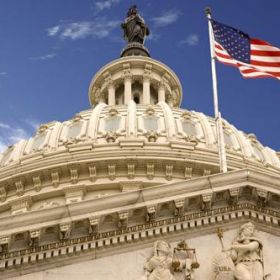Three decades ago, President Ronald Reagan could proudly proclaim “it is morning in America.” The meaning was clear. With Reagan at the helm, America would reverse its decline and emerge from the “malaise” of the 1970’s to a new and better place.
Today, mourning is the appropriate term. For reasons that were too pathetically obvious last week, the US government proved itself broken. Reopening the government and deferring the debt ceiling, despite temporary fixes, merely postponed the inevitable and did not address the fundamental political paradox that has destroyed the ability to govern. A political system of checks and balances unable to compromise will not become as defunct as the old Roman Empire or the Soviet Union. Rather than fall or implode, America will simply become less relevant.
Unless the ship of state is righted, American global leadership will be increasingly ignored, downgraded or barely tolerated. The US will still remain the world’s strongest economic and military power. However, translating that power into effective and relevant leadership to protect US interests will be far more difficult.
Consider the failed Soviet Union. Its political structure was based on fundamental philosophical and practical contradictions in which fact and truth were the first victims. The system was dishonest and corrupt. After a succession of geriatric leaders died off and Mikhail Gorbachev became General Secretary, the more youthful Politburo members had moved through a succession of portfolios. One was worse than the next. Something had to be done.
Gorbachev introduced glasnost (openness) and perestroika (restructuring). The combination was fatal. Ronald Reagan’s taunt to “tear down this wall Mr. Gorbachev” was taken up. The Soviet Union dissolved.
The US could surely use a large dose of openness and restructuring to its political system. Unfortunately, money and politics make bad bedfellows. Continuous pursuit of dollars for campaign financing abuts against every principle of good government. So too has the overlay of a Parliamentary majority of the majority in the House of Representatives been crippling to checks and balances. But the really devastating blow disenfranchised the broad middle class in favor of extreme groups of left and right. Ideology trumped reason. And facts have become obsolete.
The debate over the debt ceiling and ludicrous Tea Party arguments that the US could weather any financial storm smacked of King Canute attempting to stop the oceans. And sadly, the temporary measure that defers tough debate is not governing. It is not even crisis management. It is an admission that the system no longer works.
Meanwhile, the White House sat back relishing the self-destruction of the Republican Party as its favorability ratings sunk like iron weights. The prize is 2014 and winning the House of Representatives. So why exert leadership and get drawn into this unpleasant process?
The country will get through this debacle. Republican fortunes will improve. And divided government—which means no government—will remain the order of the day.
Can anything be done? Obviously, a bold, charismatic and forceful leader could emerge from the ashes. And tomorrow we can all be rich. Commissions will not work. And the inertia of the political status quo made even more ponderous by Gerrymandered electoral districts and irrational campaign financing laws will block any disruptive change.
Popular movements from Occupy Wall Street to Vietnam-era protests to change government will have little effect. There is only one way out of making mourning for America a permanent part of our society: leadership.
The President must lead. And he must convince members of both Houses of Congress of their responsibility and sworn oath to the Constitution, not political parties, fund raisers or interest groups. This is not President Obama’s long suit. Persuading experienced and cynical politicians such as Harry Reid, Mitch McConnell, John Boehner and Nancy Pelosi to rise above ideology and mutual animosity towards each other to pursue the greater national good returns us to King Canute.
There is no other feasible answer than leadership. On its current course, the United States is foreswearing its leadership role politically, economically, strategically and morally. That will not come out well for anyone. For example, what happens when the dollar is no longer the world’s reserve currency and the Federal Reserve cannot print our way clear of recession—a very possible long-term outcome of this gridlocked situation?
One possibility is that the US has enjoyed its finest hours. Now, it must return to earth hopefully more safely than Icarus who flew to close to the sun and perished in the fall.
When Jimmy Carter tried to persuade the nation it was on the wrong course, the speech marked the end of his presidency. Mr. Obama will avoid that trap like death. Yet, without presidential leadership, we are in grave trouble. But who will listen? And who will lead?
Harlan Ullman is a senior advisor at the Atlantic Council in Washington, D.C., and Chairman of the Killowen Group that advises leaders of business and government.
